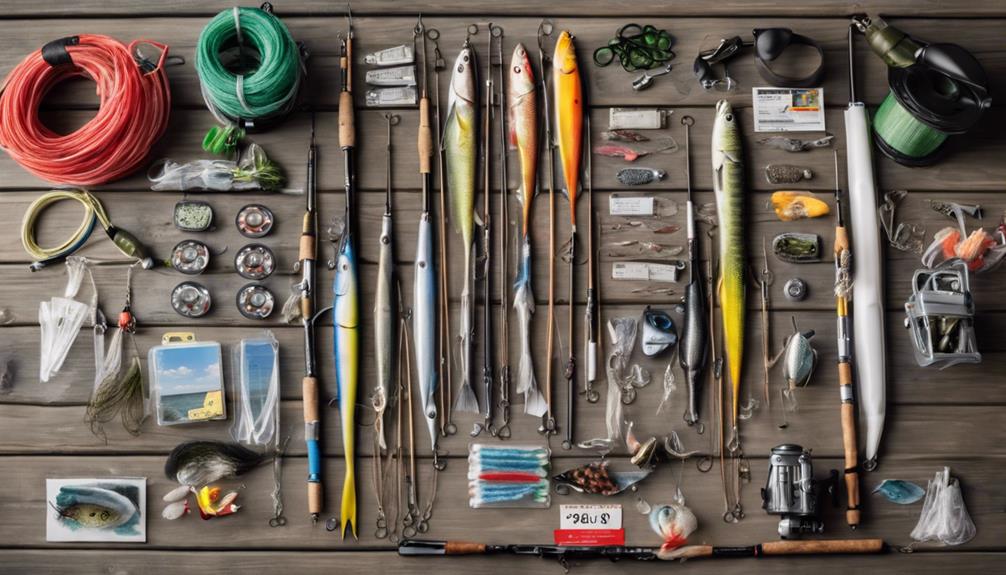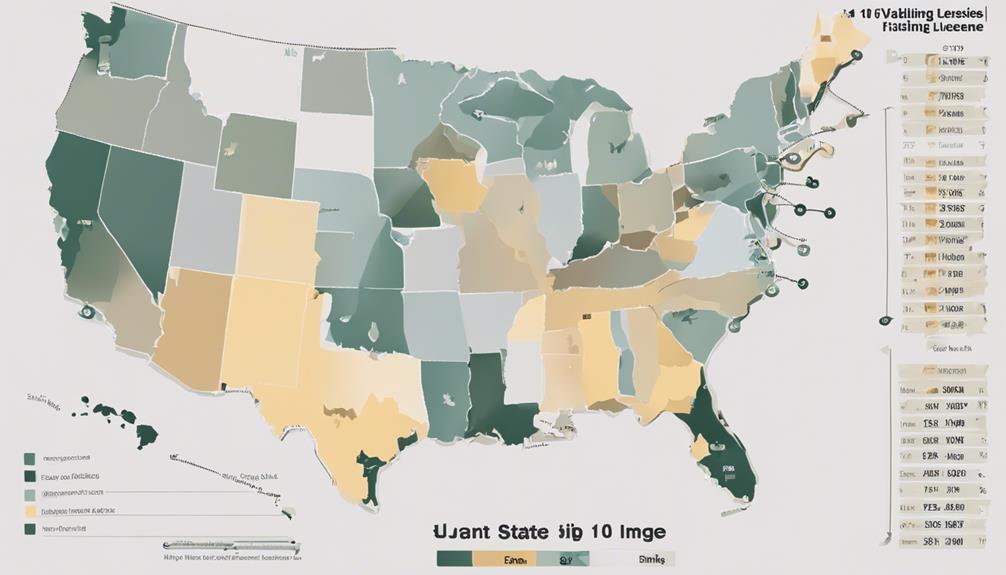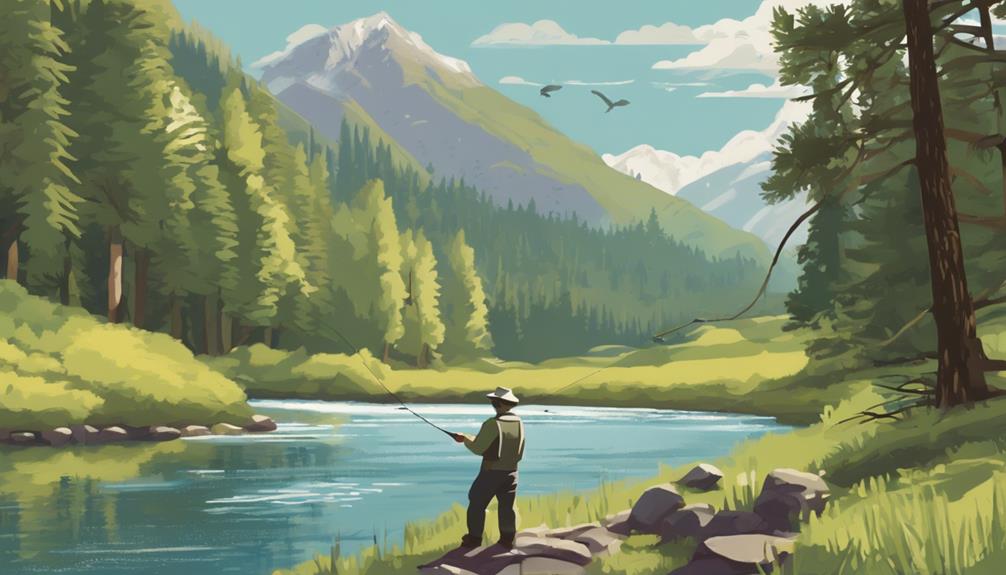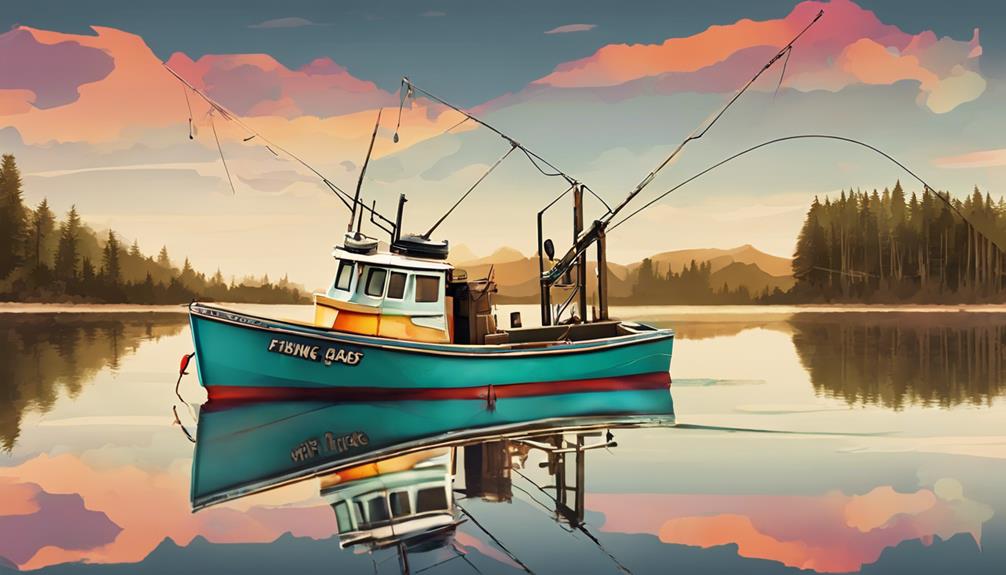Have you ever wondered why saltwater fishing licenses come with such specific rules and regulations?
Well, it goes beyond just paying a fee for permission. These requirements play a crucial role in ensuring the sustainability of marine life and protecting the delicate balance of aquatic ecosystems.
By adhering to these guidelines, anglers contribute to the conservation efforts necessary to preserve our oceans and the diverse species that call them home.
Importance of Saltwater Fishing Licenses
Obtaining a saltwater fishing license is crucial for anyone looking to engage in fishing activities in coastal waters. By having a license, you aren't only ensuring compliance with regulations but also contributing to environmental protection. These licenses play a vital role in managing and conserving fish populations, helping to maintain a sustainable balance in marine ecosystems.
When you hold a saltwater fishing license, you're actively participating in the preservation of aquatic habitats and species. The regulations associated with these licenses often include size and catch limits, which are designed to prevent overfishing and protect vulnerable marine populations. By adhering to these rules, you're playing a direct role in safeguarding the biodiversity of our oceans.
Moreover, having a saltwater fishing license enhances your recreational enjoyment while out on the water. It allows you to relax and unwind in a natural setting, engaging in a popular pastime that brings joy to many. Fishing can be a source of relaxation and excitement, offering a unique way to connect with nature and experience the thrill of reeling in a catch. By obtaining a license, you're opening up opportunities to create lasting memories and enjoy the beauty of coastal environments responsibly.
Understanding License Fees
When considering the specific requirements of saltwater fishing licenses, understanding the associated license fees is essential for planning your fishing activities responsibly. Fishing regulations often mandate the purchase of a fishing license to help fund conservation efforts, management of fish populations, and enforcement of fishing laws. These fees vary depending on factors such as the duration of the license, the type of fishing being done, and the state or region where you plan to fish.
License fees typically contribute to maintaining sustainable fishing practices and protecting marine ecosystems. By paying for a fishing license, you're supporting initiatives that aim to preserve fish populations for future generations. Understanding the costs involved not only ensures compliance with regulations but also promotes ethical and responsible fishing practices.
In some cases, certain individuals may be eligible for license exemptions based on specific criteria. These exemptions could apply to senior citizens, individuals with disabilities, or active-duty military personnel. It's important to familiarize yourself with the regulations in your area to determine if you qualify for any exemptions. While exemptions relieve individuals from paying license fees, they're still expected to adhere to all other fishing regulations in place.
Age Requirements for Licenses
Understanding who's eligible for a fishing license based on age is crucial for compliance with saltwater fishing regulations. Here's what you need to know:
- Parental Consent: If you're under a certain age, usually minors under 18, you may need parental consent to obtain a fishing license. This is to ensure that minors have the approval and supervision necessary for engaging in fishing activities responsibly.
- Educational Programs: Some states offer exemptions or reduced fees for fishing licenses to youths who've completed specific fishing education programs. These programs aim to educate young anglers on conservation, safety, and fishing ethics.
- Age-Specific Requirements: Different age groups may have specific requirements for obtaining a fishing license. For example, individuals under a certain age might be eligible for a discounted or free license, while older individuals may need to pay the full fee.
- Youth Licenses: Many states offer special youth fishing licenses designed to encourage and support young anglers. These licenses often have age restrictions and may come with certain benefits, such as reduced fees or exceptions to certain regulations.
Understanding the age requirements for fishing licenses is essential to ensure that you comply with the regulations in your state and enjoy a safe and responsible fishing experience.
Residency Vs. Non-Residency Rules
To determine if you qualify for a fishing license based on residency, consider the rules regarding residency versus non-residency status. Residency benefits typically apply to individuals who are permanent residents of the state where they're applying for the fishing license. These benefits can include lower fees, longer license durations, and access to certain fishing areas reserved for residents.
On the other hand, non-residents are individuals who don't permanently reside in the state where they're applying for the license. Non-residents often have to pay higher fees for their fishing licenses compared to residents. These fees help offset the costs associated with managing fisheries and conservation efforts in the state, as non-residents may not contribute through state taxes like residents do. Non-resident fees can vary depending on the state, with some states offering short-term non-resident licenses for tourists or visitors.
Understanding the distinction between residency and non-residency rules is crucial when applying for a saltwater fishing license, as it can significantly impact the cost and validity of your license. Make sure to check the specific regulations of the state where you plan to fish to ensure compliance with their residency requirements and fee structures.
Catch Limits and Size Restrictions
Considering the sustainability of marine ecosystems, adhering to catch limits and size restrictions is essential when engaging in saltwater fishing. By following these regulations, you contribute to conservation efforts and help maintain the delicate balance of marine ecosystems.
Here's why catch limits and size restrictions matter:
- Preserving Fish Populations: Catch limits prevent overfishing and ensure that fish populations have the opportunity to reproduce and replenish. By adhering to these limits, you support sustainable practices that benefit both the environment and the fishing industry.
- Protecting Young Fish: Size restrictions are imposed to allow juvenile fish to grow and mature before being caught. By releasing undersized fish, you help sustain healthy populations and allow them to reach their reproductive age, further aiding in conservation efforts.
- Promoting Ecosystem Health: Maintaining balanced fish populations is crucial for the overall health of marine ecosystems. By respecting catch limits and size restrictions, you help preserve the intricate relationships between different species and contribute to the resilience of these ecosystems.
- Ensuring Long-Term Fishing Opportunities: Sustainable fishing practices, including observing catch limits and size restrictions, are key to ensuring that future generations can continue to enjoy recreational and commercial fishing. Your compliance today directly impacts the availability of fish for tomorrow.
Conservation and Sustainability Measures
Preserving marine ecosystems requires implementing effective conservation and sustainability measures to safeguard the delicate balance of ocean habitats. To ensure the long-term health of marine ecosystems, fishing quotas are established to regulate the amount of fish that can be harvested. These quotas help prevent overfishing and depletion of fish populations, allowing species to reproduce and maintain their numbers at sustainable levels.
By setting fishing quotas, authorities can control the amount of fish caught, ensuring that it doesn't exceed the ecosystem's capacity to regenerate. This approach helps maintain biodiversity and the overall health of marine habitats. Additionally, sustainable fishing practices, such as using selective gear to minimize bycatch and avoiding sensitive areas, play a crucial role in protecting marine ecosystems.
Conservation efforts also extend to preserving critical habitats like coral reefs, mangroves, and seagrass beds, which serve as essential nurseries for many marine species. Protecting these habitats is vital for maintaining biodiversity and supporting healthy fish populations. Furthermore, promoting responsible fishing practices among anglers through education and awareness campaigns can help reduce the negative impacts of recreational fishing on marine ecosystems.
Special Permits for Protected Species
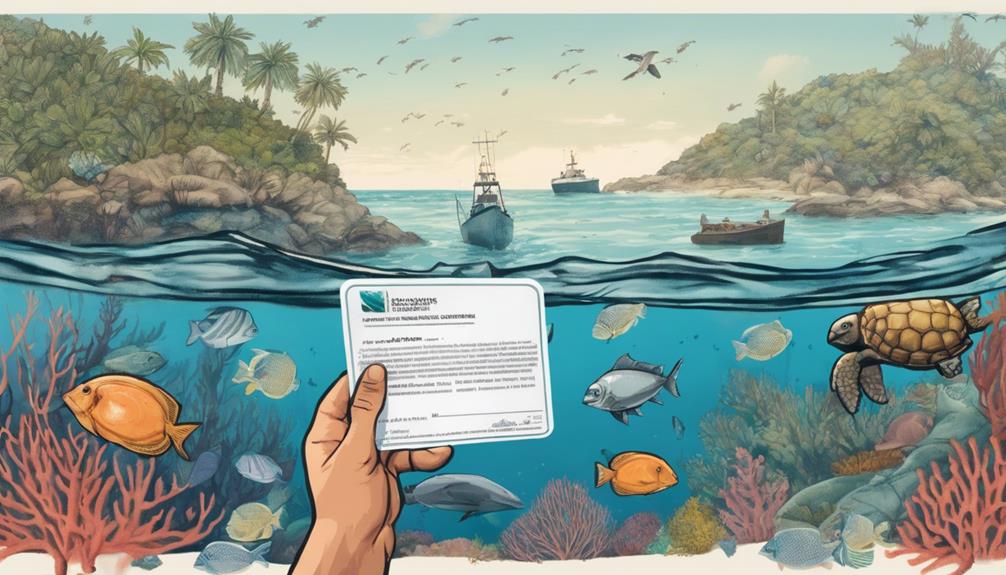
Special permits are required for fishing activities involving protected species in saltwater environments. If you're planning to fish in areas where protected species reside, make sure you understand the permit requirements to ensure compliance with regulations and contribute to the conservation efforts.
Here are some key points to consider:
- Identification of Protected Species: Before heading out for a fishing trip, familiarize yourself with the list of protected species in the area where you plan to fish. It's crucial to be able to recognize these species to avoid accidental catches.
- Permit Application Process: Research the specific permit requirements for targeting protected species in the region. Contact the relevant authorities to obtain the necessary permits and ensure you meet all the criteria.
- Catch Reporting Obligations: When fishing in areas inhabited by protected species, you may be required to report any interactions or catches involving these species. Understanding these reporting obligations is essential to comply with regulations.
- Handling Guidelines: In the event that you accidentally catch a protected species, it's important to know the proper handling procedures. Familiarize yourself with the guidelines for safely releasing these species back into the water to minimize harm and support conservation efforts.
Enforcement and Penalties for Violations
To ensure compliance with regulations and support conservation efforts, understanding the enforcement measures and penalties for violations related to protected species fishing permits is crucial. Enforcement of fishing regulations is typically carried out by state wildlife agencies, marine patrol officers, and federal authorities. These enforcement entities monitor fishing activities, inspect catches, and check permits to ensure that fishermen are adhering to the rules set forth by the permits.
Penalties for violations can vary depending on the severity of the offense. Minor infractions, such as failure to display a permit, may result in warnings or fines. However, more serious violations, such as fishing in restricted areas or targeting protected species without the proper permit, can lead to hefty fines, confiscation of equipment, and even potential jail time. Repeat offenders may face increased penalties and could risk having their fishing licenses revoked.
It is important for fishermen to familiarize themselves with the specific regulations governing protected species fishing permits in their area to avoid unintentional violations. By understanding the enforcement measures in place and the potential penalties for non-compliance, fishermen can contribute to the conservation and sustainable management of marine resources. Remember, responsible fishing practices not only protect the environment but also ensure the longevity of fishing opportunities for future generations.
Frequently Asked Questions
Can I Use My Saltwater Fishing License in Both State and Federal Waters?
Yes, you can use your saltwater fishing license in both state and federal waters. Fishing boundaries may vary, so it's essential to check the specific regulations for each area.
Some states have license reciprocity agreements with federal waters, allowing you to fish with the same license. Always ensure you're compliant with the rules of the waters you're fishing in to avoid any issues.
Are There Any Discounts Available for Senior Citizens or Military Veterans When Purchasing a Saltwater Fishing License?
Yes, there are discounts available for senior citizens and military veterans when purchasing a saltwater fishing license. Senior discounts and veteran benefits can help you save money while enjoying your favorite pastime.
Make sure to inquire about these special offers when obtaining your license. It's a great way to show appreciation for those who've served and to support our senior community in their love for fishing.
Can I Transfer My Saltwater Fishing License to Someone Else?
You can't transfer your saltwater fishing license to someone else because it's tied to your personal information. License regulations aim to ensure responsible fishing practices and prevent misuse. Transferring ownership could lead to violations and impact conservation efforts.
It's essential to adhere to these rules to maintain the integrity of the licensing system and protect marine resources. Make sure to follow the guidelines when it comes to your fishing license.
Are There Any Restrictions on the Types of Fishing Gear I Can Use With a Saltwater Fishing License?
When it comes to your saltwater fishing license, fishing regulations dictate the types of gear you can use. Gear restrictions vary depending on the location and specific rules of the area you're fishing in.
Make sure to check the local fishing regulations to ensure you're using the appropriate gear allowed with your saltwater fishing license.
It's important to follow these guidelines to protect the marine environment and promote sustainable fishing practices.
What Is the Process for Reporting Catches and Complying With Regulations While Using a Saltwater Fishing License?
When using a saltwater fishing license, you need to report your catches and follow regulations for compliance. Make sure to keep track of what you catch and adhere to all rules set by licensing regulations and enforcement.
Reporting your catches accurately helps monitor fish populations and ensures sustainable fishing practices. By following these guidelines, you can enjoy fishing responsibly while contributing to the conservation of marine resources.
Conclusion
So, now you know why saltwater fishing licenses have specific requirements. These rules are in place to protect the environment, ensure sustainable fishing practices, and regulate the fishing industry.
By following these regulations, you can help preserve marine life for future generations to enjoy. Remember, it's important to always abide by the rules and regulations set forth in your fishing license to promote conservation and responsible fishing practices.
Happy fishing!
